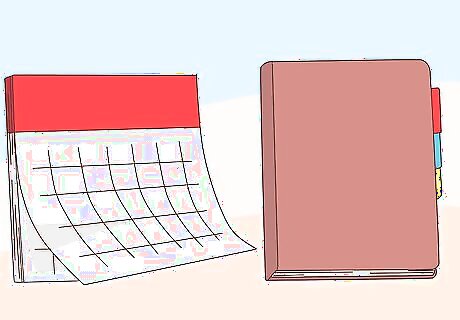
views

Organize your time. Many teachers advocate the use of a planner, but the truth is each individual has his/her own style of keeping track of things and prioritizing tasks. However, regardless of whether you are using a digital planner like Google Calendar, an online task management service, or simply a printed calendar, it is vital that you create a schedule that makes the best use of your precious time. Planning and structuring your time will also ensure that you do not lose sight of any important deadlines and assignments. It's always helpful to remember that the purpose of a schedule, after all, is to prioritize tasks based on value. Thus, you should be prepared to adapt your schedule, as the value of certain tasks and activities changes constantly as unexpected opportunities and responsibilities surface.

Create your own learning environment. Whether that means finding a room that has suitable lighting and tasteful furniture, or locating that "quiet place" with minimal disturbance that is a safe distance away from any distractions, it's essential that you find a place (and time) that fosters your intellectual growth. In regards to time, make sure that you are 100% committed when you are studying. It's not only a good idea to take a break once in a while--it's absolutely necessary, but make certain that you are devoting all of your intellectual resources to one task at a time, so that you can finish everything to the best of your abilities in a short period of time.

Balance schoolwork and other commitments. Contrary to popular stereotypes regarding "bookworms" and "nerds", some of the most successful and efficient students are those that excel both in the classroom and in greater society. Getting to know your classmates may be just as valuable as studying for that upcoming calculus examination--not only will you be able to "de-stress," but you might even be able to learn something about their techniques that can change (for the better) your learning habits. In addition, it may be a good idea to organize your own "study group." Hosting it via an online chat service is always a good idea, so that meetings are need-based and purpose-driven, not meaningless.

Be curious and dare to try something new. Explore the curriculum, as well as subjects you are interested in, beyond the classroom. If you're studying a language, for example, visiting a foreign country that speaks your language would perhaps be a fascinating opportunity to not only learn about culture but also improve your skills in a native environment. Another example would be writing--try your hand at creative writing in your free time, or edit/write online articles in places like wikiHow and Wikipedia to improve your grammar, sentence structure, and your ability to communicate ideas in a brief fashion. If you're studying accounting, perhaps an internship at your local grocer or business would be a beneficial experience. These opportunities will not only allow you to better comprehend the material you are learning and allow you to experience it first-hand, but it may also lead to interesting career development opportunities and paths that you may not have considered (not to mention the networking benefits from some employment opportunities). As Confucius said, "I hear and I forget[,] I see and I remember[,] I do and I understand."

Be passionate and challenge yourself. While a part of your course selection may already be predetermined due to the required course(s) at your institution, it's always important to follow your passions when you are able to do so. In choosing courses, make sure to challenge yourself as well--that's the point of an education, right? If you don't or aren't willing to learn anything new, you defeat the point of an education, and you might as well be sleeping the entire day.

















Comments
0 comment